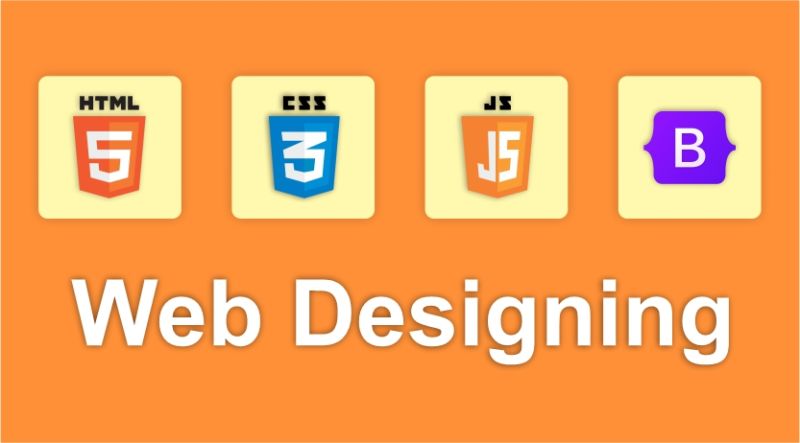
Web Designing
I. Introduction to Web Technologies
Understanding the Internet: In this module, students will delve into the foundational concepts of the World Wide Web, gaining insights into the infrastructure and protocols that power internet communication. Practical exercises will involve navigating the web and understanding the role of browsers in rendering content.
Overview of Web Designing: This section provides a historical perspective on web design evolution. Students will explore key milestones, emerging trends, and the evolving role of designers in shaping the digital landscape. Emphasis will be placed on the significance of crafting websites that prioritize a seamless user experience (UX).
II. HTML Fundamentals
Introduction to HTML: Students will grasp the fundamental structure of an HTML document, gaining hands-on experience in creating well-formed HTML pages. Discussions will cover the HTML document declaration, its importance, and variations in HTML versions.
HTML Elements and Tags: This module delves into the core building blocks of HTML. From headings and paragraphs to lists, links, images, and form elements, students will understand how to structure content effectively and create interactive web forms.
HTML Semantic Elements: An exploration of semantic HTML5 tags will highlight their role in improving website accessibility and search engine optimization. Practical exercises will demonstrate the impact of semantic markup on both user experience and website performance.
HTML Forms and Input Validation: This section focuses on the creation of dynamic and user-friendly forms using HTML. Students will implement client-side form validation techniques to enhance data integrity and user engagement.
III. Cascading Style Sheets (CSS)
Introduction to CSS: Students will master the art of styling web pages using CSS. Concepts such as selectors, properties, and the cascading nature of styles will be covered, enabling them to create visually appealing and consistent designs.
Layout and Box Model: Understanding the CSS box model and its impact on layout design is essential. This module explores the intricacies of box properties, positioning, and display options, providing students with the skills to design responsive and aesthetically pleasing interfaces.
Responsive Web Design: With a focus on user experience across devices, this module introduces media queries, flexbox, and grid layout. Students will implement responsive design techniques to ensure websites adapt seamlessly to various screen sizes.
CSS Transitions and Animations: Elevating the visual appeal of web pages, this section delves into CSS transitions and animations. Students will learn to create engaging and interactive elements, enhancing the overall user experience.
IV. Introduction to JavaScript
Basics of JavaScript: Students will gain a solid foundation in JavaScript, covering variables, data types, operators, and control flow. Practical exercises will reinforce these concepts, fostering problem-solving skills through coding challenges.
Document Object Model (DOM): Understanding the DOM is crucial for dynamic web development. This module explores how JavaScript interacts with the DOM, allowing students to manipulate HTML and CSS dynamically.
JavaScript Functions and Objects: Building on the basics, this section introduces the concept of functions and explores the creation of objects and arrays in JavaScript. Students will apply these principles to solve real-world problems through coding projects.
Asynchronous JavaScript: In this advanced module, students will explore asynchronous programming with AJAX, Fetch API, promises, and async/await. Understanding how to manage asynchronous tasks is critical for building responsive and efficient web applications.
V. Project Work
Building a Static Website: The practical application of HTML, CSS, and JavaScript comes to the forefront in this module. Students will collaborate on building a static website, incorporating the principles learned throughout the course and following industry best practices.
Version Control with Git: Understanding version control is essential for collaborative development. Students will learn the basics of Git, enabling them to track changes, collaborate with team members, and manage project versions effectively.
VI. Advanced Topics (Additional)
Introduction to Frontend Frameworks: Students opting for this optional module will gain exposure to popular frontend frameworks such as React, Angular, or Vue.js. Discussions will revolve around the benefits, use cases, and considerations when choosing a framework for web development.
Web Accessibility: This module emphasizes the importance of designing websites that are accessible to all users, including those with disabilities. Students will learn about web accessibility guidelines (ARIA) and implement strategies to create inclusive digital experiences.
VII. Final Project and Presentation
Capstone Project: The culmination of the course involves applying acquired knowledge to a real-world scenario. Students will work on a capstone project, integrating HTML, CSS, and JavaScript to solve a practical problem. The course concludes with project presentations, fostering peer review and collaborative feedback.
12th